https://pages.nyu.edu/keefer/
Story Specifics Part I
Julia Keefer, Ph.D.
Part 1: Story Specifics
To survive we need to drink water and eat some kind of food, even if it is injected as glucose. But do we need stories to survive? Every time we recount an action or listen to what happened to someone, we are engaged in storytelling. Every time we plan or hope that something will happen to us, we are engaged in the same kind of dramatic structure as our protagonist. If there were no stories, we would live in the present, erasing our footprints as if caught in a heavy snowstorm. We would not be able to learn lessons from the past, remember what happened to us, or anticipate what might happen. If we continued to eat and drink, we would exist, but we might not know where to find our food or how to make the money to buy it, how to prepare, clean and cook it avoiding disease, and how to balance our needs nutritionally; therefore, we might literally die of starvation and dehydration.
To find our food, we must kill an animal,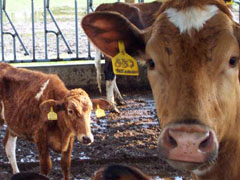
 fish, cut a plant or tree,
fish, cut a plant or tree,  gather nuts and berries, dig up a root vegetable, or just go to the store and buy food. However, we earn our money by metaphorically killing animals, cutting life, planting, gathering, digging, or just being at the job and doing what we are told. We can also find stories in all these different ways.
gather nuts and berries, dig up a root vegetable, or just go to the store and buy food. However, we earn our money by metaphorically killing animals, cutting life, planting, gathering, digging, or just being at the job and doing what we are told. We can also find stories in all these different ways.
Not all stories are told for entertainment: every discipline has its narrative so that doctors learn from case studies, lawyers from trials, and schoolchildren from educational narratives. These real life stories may not differ that much from our fictive creations, as in courtroom dramas, detective thrillers, or historical period pieces. Creating your own story is a form of empowerment, giving you a feel for some of the omnipotence of the Creator, so when the story lands in your lap, do you still see its potential?
A story is not the same as a dramatic structure that we manipulate, although some stories seem as if they were created by a top dramatist. A story is simply what happens to specific people or personified objects in a specific time and place. There may be 36 dramatic situations but there are millions of stories because people are unique.
When we pick a story from life, we take it out of its world, an excision that will determine the level of reality, be it documentary, naturalistic, realistic, romantic, fantasy, sci fi, or surreal. As you write, the reality may change, but remember the world that originally gave birth to your story.
Examine the world in which the story is created:
a) American naturalistic contemporary,
b) global indigenous,
c) historical or period,
d) sci fi,
e) aesthetic-- surrealist, impressionist, i.e. blue lens over the set as in Blue Velvet,
f) musical,
g) animation,
h) cyberspace,
i) extreme outdoor set,
j) fantasy elements but not complete sci fi. Superman Spiderman etc.
How does the protagonist's objective connect to the his or her world?
75 % of my students have this motive-- to establish a career, or get a good grade, or get into a good school. This won't work for a feature film unless it leads to higher stakes, such as a crime, insipid politics, undying love, or the ability to sacrifice for an ideal. Otherwise people won't identify with this. Or you go into a supernatural realm and you really get supernatural powers. But these mundane, petty motives don't work.
Examine the subject matter or area where main motivations occur, such as:
a) love, including sex, obsession, self-love, family love, and companionship--brotherhood, sisterhood. includes hate
b) money for greed or survival, not just the mundane weekly salary unless the character is starving
c) fame-- adulation of everyone
d) power-- governmental politics but all power plays with high stakes
e) ideals-- religious, or freedom, honesty, even magical or superhuman power -- as long as character is willing to sacrifice for them
f) crime-- anything that is against the law-- theft, murder, rape, arson, conspiracy, embezzlement-- from the point of view of the victim, (thriller) the lawyers (courtroom), detective, perpetrators (gangster) etc. Western can be in crime or war or both.
g) war-- legitimate and illegitimate wars-- between real or fictional characters with all the devastation, honor, patriotism, horror that this implies.
h) adventure-- i.e. anything for fun, battling nature for outdoor sports, or teams for sports, concerts etc. The goal is to have fun. The mode is action.
i) birth-- the desire to give birth, if you can't, either literally to a baby or to an invention or idea, or coming of age-- to give birth to an older, more mature self as in BIG.
j) death-- fighting addictions, fighting diseases, shamans, doctors, patients etc.
k) disaster--natural or manmade--where fighting the disaster is the focus more than a war or a plague which would be in other categories.
In Waiting for Godot, it is about the hope for or absence of God, hope, higher power; it isn't really about waiting for godot. Exit the King is about fighting death with an existential appreciation of life. Motivations need not be conscious or wilful.
Sometimes you must spend a long time researching the world of your story. To write my trilogy, How to Survive as an Adjunct Professor by Wrestling, I had to go over and over the events in New York after September 11, travel to Egypt, Turkey, Morocco, and Paris, and study cosmology, particle physics, the Muslim religion, and American foreign policy. For my Huguenot St. novel/screenplay, I have had to research geology, Native American tribes and culture, Huguenot religious persecution, small town politics, seventeenth century history of the Hudson Valley and Shawangunks, and various immigrant habits and cultures.
Chapter Three: Find an animal, 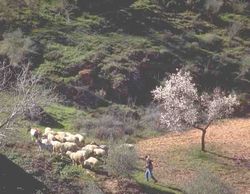 fish
fish  or nuts.
or nuts. We can get protein from the milk of goats,
We can get protein from the milk of goats,  sheep, or cows.
sheep, or cows.

Opportunity
Sometimes we don't see the stories lying around us, ripe for the picking. Sharpen your powers of observation. 
Chance Versus Choice
Life and artistic creation strike a balance with chance and choice. The Greeks of Classical Athens gradually gave man the will power to work with and even against his destiny in art and science. You can't control everything in your writing. As you sit down to have your morning coffee and read the newspaper, examine the stories that are falling into your lap. When you watch the evening news, which stories interrupt your well-being, and make you ruminate into the night? Why? What are the characteristics of a good story? How do animals choose their prey? What makes a story potentially tasty, nutritious, and vulnerable enough to succumb to your manipulation? How much control does the heroine have over her destiny in this story?
Is it a used corpse filled with rotting maggots, or a freshly killed cadaver?
As you write down this story, does it still have the power to surprise, intrigue, shock, or move? When we stumble upon stories, they may be hackneyed or cliche, in which case we will have to spend more time cooking and seasoning them with dramatic structure and sequencing.
Exercises
Read two classical stories (or watch the films) and then twist them together, making a new story. Make sure you create your specific world from scratch to get it your distinctive mar.
Chapter Four: Kill an Animal 

Although I eat meat, I hate hypocritically hate hunters 

 and could never watch an animal being slaughtered for food. But sometimes the best stories come when we symbolically kill an animal. If it hurts us, it will probably move the audience or the reader. But are we eating fresh meat, or poisoning the animal before we even kill it?
and could never watch an animal being slaughtered for food. But sometimes the best stories come when we symbolically kill an animal. If it hurts us, it will probably move the audience or the reader. But are we eating fresh meat, or poisoning the animal before we even kill it?
Part of hunting is choosing and watching the right prey, and then waiting for the exact moment to pounce.  The prey will fight for its life, unless anaesthetized, and scream as it is extinguished. From that moment on, its food potential has a shelf life, which is why we boil lobsters live. Seizing a story may have its moment of cruelty but we must be careful not to squeeze the life out of it.
The prey will fight for its life, unless anaesthetized, and scream as it is extinguished. From that moment on, its food potential has a shelf life, which is why we boil lobsters live. Seizing a story may have its moment of cruelty but we must be careful not to squeeze the life out of it.
 When you kill, you have already mangled reality, taken a slice of it and watched it bleed.
When you kill, you have already mangled reality, taken a slice of it and watched it bleed.
Violence and Storytelling
It is better to create violent stories than kill someone in real life. Shakespeare's plays are incredibly violent, yet he is considered a great writer. In the age of naturalistic filmmaking, we often do not make the right distinctions between reality and fantasy. If you censor your imagination, you will dry up your creative wellspring. Kill an animal metaphorically. Killing is an act of ultimate control: you grab the story and make it yours. However, be careful not to suffocate it. Slaughtering animals is a fine art; otherwise we will eat poisonous or putrid meat. 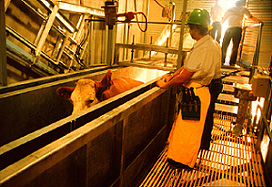 When you "kill an animal" to get a story, you are focusing on that larger-than-life protagonist whose objective is so mighty it can carry an entire movie or book, once you have cooked it with dramatic structure, prepared and seasoned it with narrative style and sequencing, and presented it to the audience-eater with the right words. You must know this person inside out, the way a hunter studies its prey.
When you "kill an animal" to get a story, you are focusing on that larger-than-life protagonist whose objective is so mighty it can carry an entire movie or book, once you have cooked it with dramatic structure, prepared and seasoned it with narrative style and sequencing, and presented it to the audience-eater with the right words. You must know this person inside out, the way a hunter studies its prey.
There is a big difference between towing the corporate line, being a responsible parent or teacher, upholding societal values and suppressing your emotions, and seizing stories with a rapist's ravenous obsession, stealing souls, to create something new of your own. Like childbirth, the birth of a story can be bloody, painful, and even ugly. The time for censorship and good manners comes afterwards when you are marketing it for a particular audience. But the story itself must be dramatic--and you know what that means.
Chapter Five: Cut a Plant or Tree 
We pick fruits--apples, pears, and peaches--from the trees;  when ripe, they will fall. We have to wait until the time is right, otherwise the fruit will be a bud, too green, inedible, or rotten. Tomatoes ripen in the sun and then we pluck them.
when ripe, they will fall. We have to wait until the time is right, otherwise the fruit will be a bud, too green, inedible, or rotten. Tomatoes ripen in the sun and then we pluck them. 
From the News Write down one story a day from the news. Then write down what interests you most about it, imagining a back story before the event occurred, as well as the best and worst things that could now occur.
Write down one story a day from the news. Then write down what interests you most about it, imagining a back story before the event occurred, as well as the best and worst things that could now occur.
Listen to a story that a friend tells you. Imagine if the same thing happened to you. How would you react and what would you do next? Friends and family have wonderful stories to steal and tell, but if you don't disguise the details, they may never speak to you again.
Plagiarism, Paraphrasing and Public Domain
It looks as if you can just grab a pumpkin from this field and no one will notice. However, you could get arrested. Plagiarism isn't just about stealing words, it's also about stealing stories, unless they have existed so long they are in the public domain.
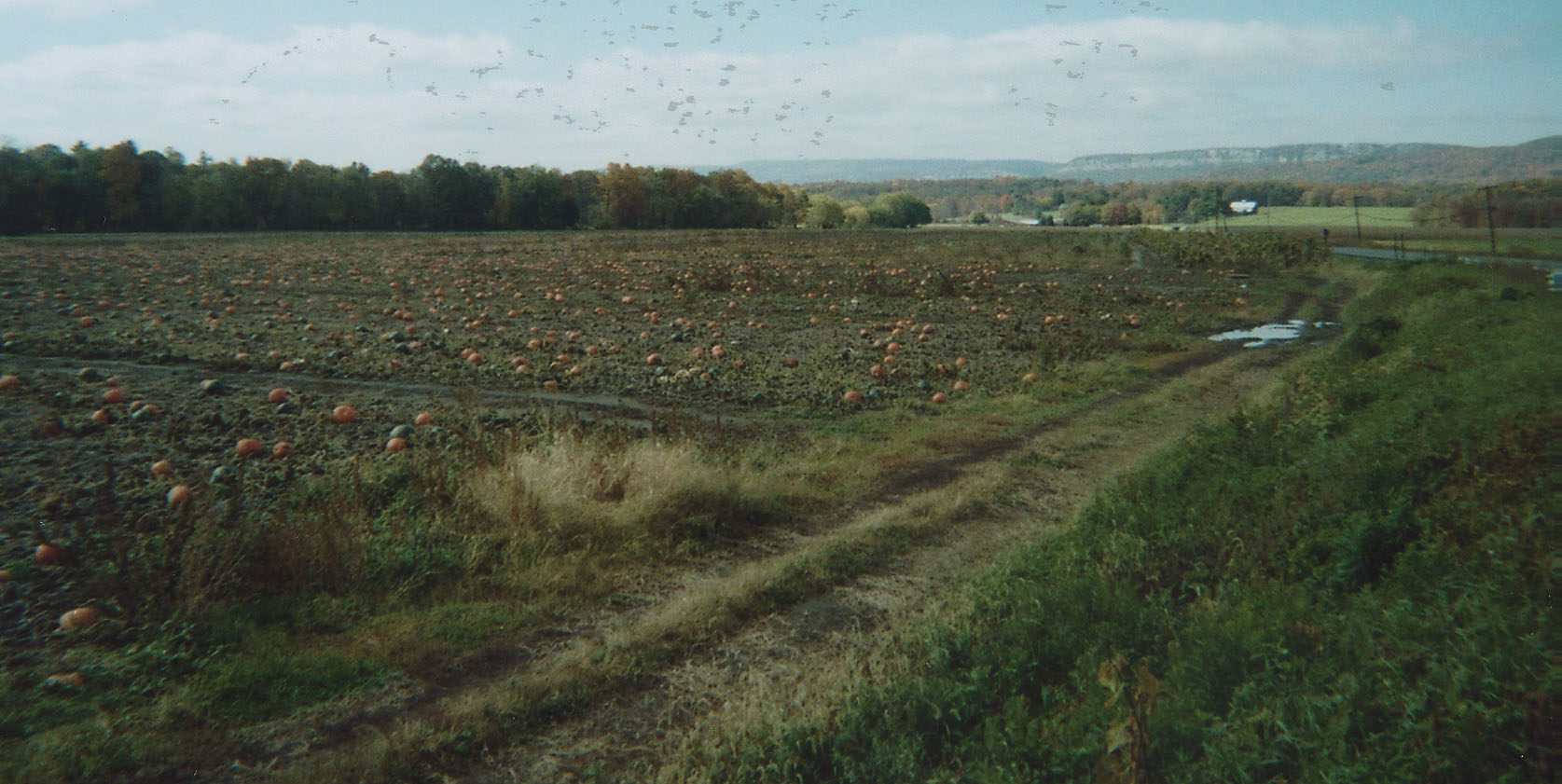
Paraphrasing means to put the material in your own words; by making a compost of different stories, you can also create your own new story.
Cutting a plant or tree implies that it was growing in a certain soil. When you pluck a story, study how and where it came into being, so you will know how much of this you want to include in your own work.
Chapter Six: Plant Your Own Garden and Dig up a Root
You can steal from our gardens or plant your own. This is a bean garden and beans are protein.
This is a bean garden and beans are protein. 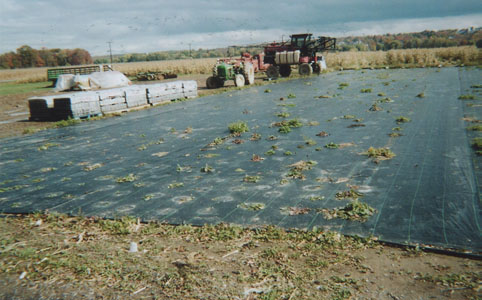
Potatoes, squash, turnips are root vegetables--hearty carbohydrates. To find some food we must get dirty digging in the soil. 
Digging up memories can be dirty and exhausting, but there is often the reward of beautiful and often, unexpected, growth. 
Time past, present, future, and superimposed can all be used when you make your own garden.
The Difference between Classical Screenwriting and Personal Writing
The following comparison pits traditional Greco-Euro-American dramatic structure against memoir
Human drama has been dissected, crafted and coded for centuries in countries all over the world. In the twentieth century Hollywood has made formulas out of dramaturgy, so that expensive, splashy productions are grounded in the essentials of catharsis and resolution. Students spend so much time analyzing films and learning rules that their scripts are often unoriginal and formulaic. Originality comes from what is unique about our lives and our imaginations. The difficulty comes when one tries to convert life experience, memory, fantasy and dreams into very structured drama. Many dramatists-- Jeffrey Sweet et al.-- feel that drama should never be autobiographical because there are too many unconscious wish fulfillment and victimization obstacles to overcome. We see the story from OUR point of view instead of orchestrating characters who can fight equally and fairly to resolve the conflicts. In real life our objectives change everyday-- we usually want too many things all at once. We fantasize about something, create a dream for which to strive; yet most of us know, especially as we get older, that this is an illusion, a rainbow, a frontier that becomes a mirage as we approach. If we try to live in the mirage, it often becomes a delusion. Most of the things we work for-- a good education, an interesting career, money, a loving, supportive marriage, healthy, happy children, a comfortable retirement-- have their downsides. Memory picks the best of the past and constructs an impossible future with our imaginations. Whenever we try to live a dream, we find something wrong with it. But audiences come to the theatre to pretend their dreams are real and valid, that there is substance to the rainbow. The minute the audience feels that the dream is mundane, tawdry, too small, pathetic, they lose their sympathy for the journey. Most love affairs eventually end with the realization that the loved one's shit smells as bad as one's own. Human imperfection is necessary to drama but the climax can't be anticlimactic or the audience will just stay home and deal with their personal misery.
The hero must also be more of a hero than in real life. This doesn't mean that she can't have excessive faults and imperfections, in fact, the more excessive the better, but that her struggle never wavers. In real life, when we start to encounter too many obstacles, we back away and either give up the dream or try something else. In drama, the obstacles must be overwhelming to test our courage and focus. So the hero must have extraordinary courage and focus, even though they keep making enormous mistakes and suffering from grievous shortcomings. The journey is also much more relentless than in real life. No one would have the patience to keep hacking away at something that long and that inexorably. This applies to individual scenes as well as the spine of the story. Yet in real life, when the frustration, desire, ambition, jealousy and forbidden lust become too strong, we withdraw and suppress our feelings. You can never do this in drama: you must stay with each scene until it erupts into the most passionate love, hate, anger or sadness that it contains and then use this emotion to change the characters' moods, plans and decisions enough to weave the story forward. Although we live in a more multifocal, hypertextual world now with cyberspace, we cannot let this diffuse drama. Instead we can construct multiple story lines, all with their own kind of catharsis. We can make the story more complex and multifaceted to challenge more sophisticated viewers but we must understand the essentials of drama, which are to place human behavior in a pressure cooker until it boils over and to let the heat make people pursue dreams with more passion, hope and courage than they would in real life. It's good for the hero to have more than one dream but only because we have to pit the dreams against each other-- force her to choose between them. When we create drama out of our personal experience, we are often manically motivated to work on the story because it's a kind of wish fulfillment. Unconsciously we want to change our own lives, to be more heroic and special than we are, to fulfill our dreams and to make sure that that rainbow isn't a mirage. We also don't see our antagonists objectively. We might not see their vulnerability and their objectives clearly. In real life we often perceive ourselves as "victims" of other people, bad circumstances, bad genes etc. We rarely take complete responsibility for our actions. As dramatists, we must make the hero responsible-- otherwise the story is just a mosaic of unfortunate circumstances. We must see the depth, goodness, vulnerability in the people who thwart our dreams.
Another problem with characters in real life compared to those in drama is the transformation. In real life we try to grow and change, but rarely do. Or we change a bit with changes in time and space, and then regress to our former selves. We may occasionally "learn" from our mistakes, but we rarely overcome our faults completely. Audiences like to see characters transform as a result of their trials. They want to see characters do what they can't because otherwise, they can just stay home and stew in their own dirt. When we create objectives, characters and scenes from real life, there is a spontaneity, unique quality that gives the script a special energy and style. Yet Shakespeare kept his characters fairly achetypal, and while the emotions may have come from his own life to some degree, the circumstances were always disciplined in a dramatic way, and the stories were even plagiarized from old myths. This is one reason, besides his beautiful poetry and depth of psychological insight, that make his plays transcend time and space, language and culture. But screenwriting isn't the same as classical stage drama. It has some of the novel and the documentary film because it is so naturalistic. It records specific people in a very concrete, detailed world. The screenwriter doesn't WRITE this world the way a novelist does-- that's the job of the cinematographer-- but the screenplay must provide the blueprint for a unique, concrete world. Therefore when the script comes from personal experience, empirical observation, memory, fantasy, then this world has an immediacy, a freshness, a reality that doesn't come from classical archetypal drama.
A good screenwriter can hear the dialogue in real life and make it dramatic; can see the humor and incongruity in our everyday activities and tighten them into plot points; can stay with the pain of personal experience long enough to imagine what would happen if it erupted in a catharsis. But the hard thing is to rip one's dreams apart and to see ruthlessly into one's imperfections. Then the hardest thing is to pull back and give all the characters equal focus to fulfill themselves, even if it goes against one's deepest wishes. It also takes tremendous endurance to stick with a screenplay based on a personal experience you have outgrown or are forced to forget or abandon. In real life, we forget and move on when things get too painful. Writing a screenplay about it makes us stew in our own juices when we would rather flush them down the toilet. That's why most dramatists say it's better not to take drama from real life. Most people lack the psychological profundity, the courage, and maybe even the masochism to mutilate their dreams. Then the other problem is that most people's lives are fairly boring compared to what's demanded on the screen. Either boring or dramatic in such a chaotic, episodic way that all dramatic cause and effect relationships are destroyed. So while the screenwriter can draw from real life, she must make sure that the events are exaggerated enough to be interesting and then structured enough to follow the hero's journey. This means changing real life with imaginative fantasies such as: "what if the opposite were true?" "what if she got what she wanted?" "what if the worst thing happened?" "what if she said what she really felt?" "what if she had to choose between two really wonderful things but lose one of them forever?" "what if she had to choose between two really awful punishments?" In real life we rarely make ourselves take these decisions to the end. We usually let fate and victimization share some of our responsibility. Once the story is created then, it's best to seal it off from reality, and to live in that world enough to write a final draft that has cinematic thrust and immediacy. This is similar to giving birth and should have the same kind of pain and separation. Nothing is sacred in a dramatist's life: everything must be surrendered to imaginative mutilation. To take drama from personal life, one must be in the habit of writing a personal journal so confessional, so deep, insightful, incriminating and provocative that the screenwriter would be terrified if a loved one got hold of it and read it literally. Then one must have a thorough, meticulous knowledge of the craft of screenwriting. To construct a dramatic story from personal experience, one must then take a knife to one's soul and sculpt away. That's why so many dramatists advocate constructing drama from observation of and empathy for others made unique with personal emotion and imagination, rather than dramatized autobiography.
Recombinant Storytelling
Years ago a famous producer friend of mine said that there is only one kind of story that guarantees success in America and it is a rags to riches simple story with lots of action and some sort of contest that pits two groups of people against each other with characters who must NOT be intellectual, overly educated, complicated or exceptional because no one will identify with them-- they must be run of the mill American suburbanites and whether rich or poor, they should speak in simple language like Bush. The twists and turns in the plot can involve surprise and suspense following the main action but every word must be understanable by everyone. these films cannot be layered like Shakespeare-- they must be dumb. Even the Great Gatsby, a great novel, is a rags to nouveau riche story of oedipal love, delusion, adultery and deception with twists and turns for the murder. Although Gatsby dies, there is a happy ending for the Buchanans and the narrator and the American Dream because Fitzgerald hides his satire. All the words are easy to understand. This book has universal appeal, but many people in the world are sick of the American story. For the French and some British, it is too predictable and unsophisticated; for the Muslims it shows too much of the decadent lifestyle without any transformation out of corrupt values-- transformations are really to enable the character to be more successful with money and love, not with Allah. The Asians see a loss of community although they are drawn visually to the films. The South Americans copy them but add their own twist like the priests who are always committing adultery. The Republican story is rags to riches-- the poor immigrant who becomes a successful entrepreneur, starting and growing small businesses like well-loved flowers. Shakespeare's tragedies dealt with the downfall of kings and queens and other stories have other themes. Chekhov wrote about riches to rags with the Russian revolution. Great writers are not always popular.
Story is culture-specific. Americans like Rocky, Rambo, Death of a Salesman, stories about the little, stupid, blue collar guy finding fame and fortune, or the sweet, innocent blonde confronted with evil. So the Jessica Lynch story is eaten up by Hollywood . A blonde, pretty, very young, fairly poor, not brilliant woman joins the military to be a kindergarten teacher and ends up fighting the Iraqis, getting captured, healed by good Iraqis and rescued by four levels of the American military, thanks to their prowess and the kindness of Mohammad the lawyer who walked six miles to find help, and the cute 24 year old doctor who is also the Platonic Love interest. This story is photogenic because Jessica is young and pretty and blonde, and the because the rescue was visually spectacular; it also has a happy ending, and doesn't offend anyone. No one is intellectual, bitter, or cynical; there is no ambiguity. Character transformation occurs as Jessica goes from hating Iraqis to trusting, respecting, loving and missing them. Other women, such as the Hopi Indian with two young children, who was killed in combat, or the Black cook, a single mother of a young child, who was rescued with the other POWs at the end of the hostilities, did not merit the same attention as Jessica, because they weren't as photogenic or they were dead, which is an unhappy ending.
Shakespeare obeyed the cultural constraints of his civilization's stories by plagiarizing ones about fallen royalty or the blend of supernatural and natural. I run into trouble by making my heroine old, brilliant, athletic, too agressively sexual, and disenfranchised, something that goes against the American dream. This has always been my problem-- not conforming to anything.
I just saw City of God, a Brazilian film. The opening and closing montage of gangs chasing a chicken through the slums is brilliantly conceived and shot.  The sequencing is brilliant. It is essentially a first person memoir, a true story of a street kid who escaped the violence of the drug gangs by the equally violent career of photographer. However, the narrative structures tell different stories, like Arabic narrative, around the central theme, rather than pit it in Aristotelian or Syd Field structure. At first it seems loose, episodic, although each scene is milked for maximum violence. But then the structure is clear as a first person narrative. At first I thought the paradigm was like an art film because of the fancy sequencing but it is really a character transformation--how I escaped the slums by becoming a photographer. The ordinary world is the commercial world and the special world takes up most of the film. The elixir is that only the hero has the courage to take the most provocative pictures, because he grew up in the slums.
The sequencing is brilliant. It is essentially a first person memoir, a true story of a street kid who escaped the violence of the drug gangs by the equally violent career of photographer. However, the narrative structures tell different stories, like Arabic narrative, around the central theme, rather than pit it in Aristotelian or Syd Field structure. At first it seems loose, episodic, although each scene is milked for maximum violence. But then the structure is clear as a first person narrative. At first I thought the paradigm was like an art film because of the fancy sequencing but it is really a character transformation--how I escaped the slums by becoming a photographer. The ordinary world is the commercial world and the special world takes up most of the film. The elixir is that only the hero has the courage to take the most provocative pictures, because he grew up in the slums.
The point is the sociopolitical message, the theme, the memoir. Each scene is dramatic but it does not follow the Hollywood , Shakespearean or Aristotelian paradigms. Little guy makes good is more of an American, new world story. The energy is American because so much of America is Latin and Black. There is a racial statement here too which goes against type because the whiter female journalist seduces the black virgin male ghetto kid photographer.
Is this first person narrative a different paradigm or a technique that goes through all paradigms? Is art film a separate paradigm or a technique as well? How can an art film be a sociopolitical film? Existential films don't have a transformation? Is there an Old World and a New World paradigm?
In each scene, the characters did want different things and all the conflict was visual.
Scene Study is in the present while structure looks back to the past from the future.
Once you have your story, look at your characters.

 fish, cut a plant or tree,
fish, cut a plant or tree,  gather nuts and berries, dig up a root vegetable, or just go to the store and buy food. However, we earn our money by metaphorically killing animals, cutting life, planting, gathering, digging, or just being at the job and doing what we are told. We can also find stories in all these different ways.
gather nuts and berries, dig up a root vegetable, or just go to the store and buy food. However, we earn our money by metaphorically killing animals, cutting life, planting, gathering, digging, or just being at the job and doing what we are told. We can also find stories in all these different ways.  fish
fish  or nuts.
or nuts. We can get protein from the milk of goats,
We can get protein from the milk of goats,  sheep, or cows.
sheep, or cows.






 and could never watch an animal being slaughtered for food. But sometimes the best stories come when we symbolically kill an animal. If it hurts us, it will probably move the audience or the reader. But are we eating fresh meat, or poisoning the animal before we even kill it?
and could never watch an animal being slaughtered for food. But sometimes the best stories come when we symbolically kill an animal. If it hurts us, it will probably move the audience or the reader. But are we eating fresh meat, or poisoning the animal before we even kill it?  The prey will fight for its life, unless anaesthetized, and scream as it is extinguished. From that moment on, its food potential has a shelf life, which is why we boil lobsters live. Seizing a story may have its moment of cruelty but we must be careful not to squeeze the life out of it.
The prey will fight for its life, unless anaesthetized, and scream as it is extinguished. From that moment on, its food potential has a shelf life, which is why we boil lobsters live. Seizing a story may have its moment of cruelty but we must be careful not to squeeze the life out of it.  When you kill, you have already mangled reality, taken a slice of it and watched it bleed.
When you kill, you have already mangled reality, taken a slice of it and watched it bleed. When you "kill an animal" to get a story, you are focusing on that larger-than-life protagonist whose objective is so mighty it can carry an entire movie or book, once you have cooked it with dramatic structure, prepared and seasoned it with narrative style and sequencing, and presented it to the audience-eater with the right words. You must know this person inside out, the way a hunter studies its prey.
When you "kill an animal" to get a story, you are focusing on that larger-than-life protagonist whose objective is so mighty it can carry an entire movie or book, once you have cooked it with dramatic structure, prepared and seasoned it with narrative style and sequencing, and presented it to the audience-eater with the right words. You must know this person inside out, the way a hunter studies its prey. 
 when ripe, they will fall. We have to wait until the time is right, otherwise the fruit will be a bud, too green, inedible, or rotten. Tomatoes ripen in the sun and then we pluck them.
when ripe, they will fall. We have to wait until the time is right, otherwise the fruit will be a bud, too green, inedible, or rotten. Tomatoes ripen in the sun and then we pluck them. 
 Write down one story a day from the news. Then write down what interests you most about it, imagining a back story before the event occurred, as well as the best and worst things that could now occur.
Write down one story a day from the news. Then write down what interests you most about it, imagining a back story before the event occurred, as well as the best and worst things that could now occur.
 This is a bean garden and beans are protein.
This is a bean garden and beans are protein. 


 The sequencing is brilliant. It is essentially a first person memoir, a true story of a street kid who escaped the violence of the drug gangs by the equally violent career of photographer. However, the narrative structures tell different stories, like Arabic narrative, around the central theme, rather than pit it in Aristotelian or Syd Field structure. At first it seems loose, episodic, although each scene is milked for maximum violence. But then the structure is clear as a first person narrative. At first I thought the paradigm was like an art film because of the fancy sequencing but it is really a character transformation--how I escaped the slums by becoming a photographer. The ordinary world is the commercial world and the special world takes up most of the film. The elixir is that only the hero has the courage to take the most provocative pictures, because he grew up in the slums.
The sequencing is brilliant. It is essentially a first person memoir, a true story of a street kid who escaped the violence of the drug gangs by the equally violent career of photographer. However, the narrative structures tell different stories, like Arabic narrative, around the central theme, rather than pit it in Aristotelian or Syd Field structure. At first it seems loose, episodic, although each scene is milked for maximum violence. But then the structure is clear as a first person narrative. At first I thought the paradigm was like an art film because of the fancy sequencing but it is really a character transformation--how I escaped the slums by becoming a photographer. The ordinary world is the commercial world and the special world takes up most of the film. The elixir is that only the hero has the courage to take the most provocative pictures, because he grew up in the slums.